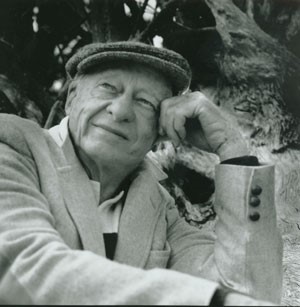Stetson Kennedy
Folklorist, Author

1916 - 2011
Inducted in 2005
Biography
With a life of literary works including his classic book on Florida folklore, Palmetto Country, Kennedy is best known for his book The Klan Unmasked (1954) and other works that aided in the fight against discrimination in the South. Kennedy's illustrious career as a pioneering Florida folklorist and social activist represents a deep commitment to both the heritage and the future of Florida.
Kennedy was born into an old family of Jacksonville's high society in 1916. His grandfather had served as an officer in the Confederate Army, and his mother was a leading member of the Daughters of the Confederacy. As a teenager, Kennedy worked for his dad–a furniture merchant–as a bill collector, knocking on doors of customers with "a dollar down and a dollar a week" accounts with his father's store. The work exposed him to aspects of Florida folklore that caught his attention and stuck with him.
What also stuck with him in his youth was the racism prevalent in all walks of Southern life. His family had a beloved black maid named Ellie who was the target of vicious slurs by white youths one day in Kennedy's presence. The incident made an indelible impression on him.
As a student in Robert E. Lee High School, Kennedy began to write poetry and stories pulled from tales he'd heard from neighbors. After high school, Kennedy enrolled at the University of Florida, where he took a creative writing course taught by Marjorie Kinnan Rawlings. But in 1937, he dropped out to join the Florida Writers Project, an arm of the federal government's Work Progress Administration. At age 21, Kennedy found himself in charge of the project's folklore effort. As such, he led a statewide hunt to collect as much Florida folklore as possible, including oral histories and ethnic studies. In this role he served as the supervisor of Zora Neale Hurston, who joined him on numerous field trips.
In 1942, Kennedy established his reputation as a master folklorist when he published Palmetto Country, based on material he collected during his WPA days. Published as a volume in the American Folklore Series edited by Erskine Caldwell, the piece was highly praised by legendary American folklorist Alan Lomax.
Spared military service because of a bad back, in 1942 Kennedy took a job in Atlanta as southeastern editorial director for a political action committee run by the Congress of Industrial Organizations, a trade union that eventually became the AFL-CIO. In this capacity Kennedy became an ardent champion for the civil rights of blacks. He wrote a series of stories that condemned the Jim Crow, racist infrastructure of Southern politics, which included the poll tax, all-white primaries, the influence of the Ku Klux Klan and other elements that inhibited black suffrage.
In 1945, Kennedy began working as a journalist for the leftist daily newspaper PM, published in New York City. His stories often appeared in other newspapers and magazines, e.g. The Nation, establishing him as a national source of information on the South's Jim Crow system.
During this period, Kennedy spent much of his time investigating the Ku Klux Klan, often surreptitiously. In 1946, he published Southern Exposure, the first of a series of books and monographs aimed at exposing the secret inner-workings of the Klan and other instruments of discrimination he saw at work in the South.
Not surprisingly, Kennedy became a target of race-baiters throughout the South, and a hero to civil libertarians nationwide. Legendary folk singer/songwriter Woody Guthrie became a fast friend and a frequent guest at Kennedy's Florida home at Fruit Cove, Florida, on the shores of Lake Beluthahatchee in St. Johns County.
Despite becoming, in his own words, "the most hated man in Florida," Kennedy took an interest in pursuing a life in politics. In 1950 he ran for the Florida Senate on a "Total Equality" ticket, finishing last. In 1952 he made a token effort at running for governor, for which his friend Guthrie wrote a campaign song on his behalf.
But when his home was firebombed by enemies, destroying many of his papers, he fled the country for France. In the U.S., Kennedy's writings had become regarded by publishers as too incendiary to touch, but in Europe he found ample support. He became friends with the acclaimed philosopher and writer Jean-Paul Sartre, who liked Kennedy's work and helped get his books published in France.
The most important book appeared in 1954, initially entitled I Rode With the Klan (later reissued as The Klan Unmasked). The book recounted Kennedy's personal involvement with the Klan while working as a journalist in Atlanta. The Klan Unmasked became popularized as the most sensational expose ever written about America's most infamous organization devoted to white supremacy.
After returning to the U.S. in 1956, Kennedy stayed active in the civil rights and peace movements both as a writer and lecturer. In the 1960s, he wrote a column, "Up Front Down South," for the Pittsburgh Courier. In 1965, he was hired as assistant director in Miami for President Lyndon Johnson's anti-poverty program.
The Stetson Kennedy Foundation, chartered by the State of Florida and headquartered in Beluthahatchee (meaning "place of peace") where Kennedy still lives, is dedicated to carrying on Kennedy's legacy of struggle on behalf of "Fellow Man and Mother Earth." Repositories for his papers include the New York Public Library's Schomburg Center for the Study of Black Culture, Southern Labor History Archives at Georgia State University, and the University of South Florida.
Kennedy remains an active writer. In 2008, Pineapple Press published his most recent book, Grits and Grunts, a collection of Key West folklore.
Related Links
- Official website - http://www.stetsonkennedy.com/

